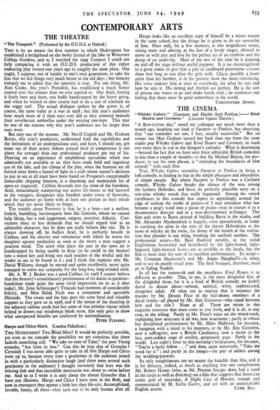CONTEMPORARY ARTS
THE THEATRE The Tempest." (Performed by the O.U.D.S. at Oxford.) THIS is by no means the first summer in which Shakespeare has established a bridgehead on the bosky littoral of the lake in Worcester College Gardens, and as I watched the 1949 Tempest I could not help comparing it with an O.U.D.S. production of this rather endearing play twenty-one years ago in roughly the same place. One ought, I suppose, out of loyalty to one's own generation, to take the line that we did things very much better in the old days ; but honesty Compels me to admit that the opposite is true. For one thing, Mr. Alan Cooke, this year's President, has established a much firmer control over the climate than we ever aspired to. Our Ariel, footing it _featly here and there, was badly handicapped by the heavy going, and when he wished to alter course had to do a sort of telemark on the soggy turf. The actual dialogue spoken by the actors is, of course, the same today as it was in 1928 ; but this year's audiences hear much more of it than ours ever did as they cowered beneath their reverberant umbrellas under the warring tree-tops. This may be one of the reasons why this year's audiences are far larger than ours were.
But only one of the reasons. Mr. Nevill Coghill and Mr. Graham Berins, this year's producers, understand both the capabilities and the limitations of an undergraduate cast, and have, I should say, got more out of their actors (whose natural level of competence is not above the average) than our professional producer got out of his. Drawing on an experience of amphibious operations which was admittedly not available to us, they have made bold and ingenious use of the lake, and the climax of the play, when the humans are all ferried away down a funnel of light in a craft whose master's decision to put to sea at all must have been based on Prospero's exceptionally favourable shipping forecast, is a charming and memorable bit of open-air stagecraft. Caliban descends into the slime of the foreshore, Ariel, miraculously scampering out across lily-leaves to bid farewell to the voyagers, disappears into freedom under -cover of fireworks, and the audience go home with at least one picture in their minds which they are never likely to forget.
The trouble about Prospero is that he is a bore—not a mellow, foolish, bumbling, inconsequent bore like Gonzalo, whom we cannot help liking, but a real juggernaut, exigent, assertive, didactic. Con- vention more or less demands that we should regard him as an admirable character, but he does not really behave like one. He is always showing off, he bullies Arid, he is perfectly beastly to Caliban, and the alacrity and vehemence with which he warns his daughter against unchastity as soon as she meets a man suggest a prurient mind. The actor who plays the part in the open air is handicapped by being unable to drop (as he could in the theatre) into a minor key and bring out such touches of the wistful and the tender as are to be found in it - and I think this explains why Mr. David Williams, though he moved and spoke excellently, never quite managed to enlist our sympathy for the long-lost, long-winded exile.
Mr. A. W. J. Becker was a good Caliban (in 1928 I cannot believe that the thonster's unsatisfactory performance of his duties as gardener- handyman made quite the same vivid impression on us as it does today), Mr. John Schlesinger's Trinculo had moments of considerable felicity, and Miss Ralda Nash was a competent and agreeable Miranda. The swans and the bats gave the same loyal and valuable support as they gave us in 1928, and if the tempo of the shunting in the adjacent railway yards had lost some of that pristine vigour which helpecUto drown our windswept blank verse, that only goes to show what unexpected benefits are conferred by nationalisation.


































 Previous page
Previous page